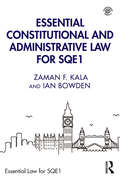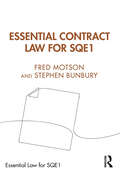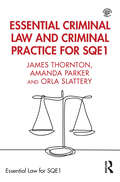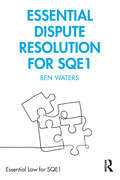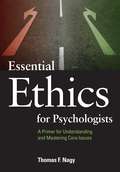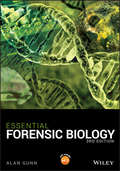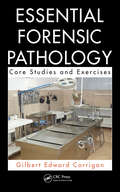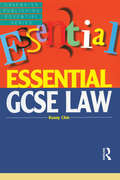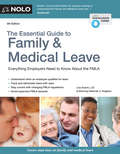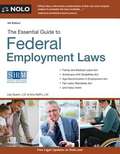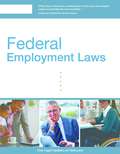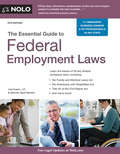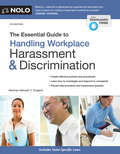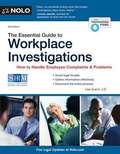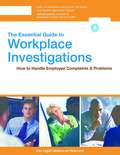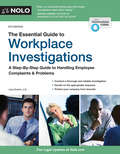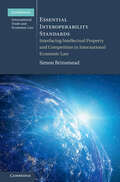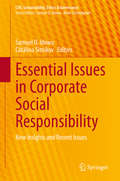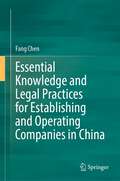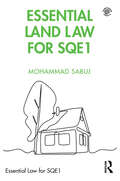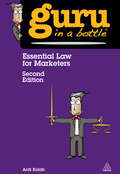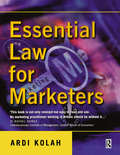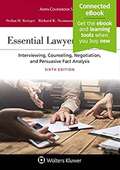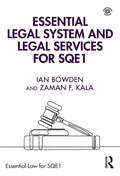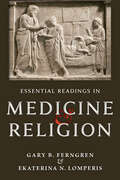- Table View
- List View
Essential Constitutional and Administrative Law for SQE1 (Essential Law for SQE1)
by Ian Bowden Zaman F. KalaEssential Constitutional and Administrative Law for SQE1 explains key principles of the UK constitution, the organs of the state, judicial review, as well as retained EU law/assimilated law, in a clear, concise, and easy-to-understand style. The use of practical examples allows such key principles to be effectively introduced and illustrated. It demonstrates the importance of the system of supremacy and the rule of law and how the concept of separation of powers ensures effective governance, including an understanding of human rights legislation and public order law.The book provides a clear and structured approach with opportunities to apply the relevant principles to the law. The book also includes a range of interactive features including:● Revision points: Each chapter concludes with a concise list of key revision points.● Multiple Choice Questions: Each section of the book provides multiple choice questions following the SQE1 question format (with answers to enable you to test your knowledge).Further multiple choice questions and answers are also provided on the companion website.Part of a series of books aimed at those who are preparing for SQE1, this concise and accessible text provides a clear understanding of the key principles of the essential constitutional and administrative law and will enable you to test your assessment skills.
Essential Contract Law for SQE1 (Essential Law for SQE1)
by Fred Motson Stephen BunburyEssential Contract Law for SQE1 explains the key principles of contract law in a clear, concise, and easy-to-understand style. Written specifically for SQE study, this book covers all of the topics contained in the syllabus for the contract law subject area in SQE1 Functioning Legal Knowledge (FLK) assessments.The book provides a clear and structured approach with opportunities to apply the relevant principles to contract law. It also includes a range of features designed to help you test and confirm your knowledge of contractual legal principles, including: Revision points: Each chapter concludes with a concise list of key revision points Multiple choice questions: Each section of the book provides multiple choice questions following the SQE1 question format (with answers to enable you to test your knowledge) Part of Routledge’s Essential Law for SQE1 series, this concise and accessible text provides a clear understanding of the key contractual principles and the core rules that underpin contract law and will enable you to test your assessment skills. Without the assumption of any prior knowledge of contract law, it is suitable for both undergraduates and non-law graduates.
Essential Criminal Law and Criminal Practice for SQE1 (Essential Law for SQE1)
by James Thornton Amanda Parker Orla SlatteryEssential Criminal Law and Criminal Practice for SQE1 explains the key principles of criminal law, criminal practice and ethics in a clear, concise and easy-to-follow style. Principles are introduced and illustrated with reference to practical examples. It is split into three parts: 1) the criminal law 2) criminal practice and 3) useful/illustrative cases which have established or illustrated an important part of the criminal law.The book provides a clear and structured approach with opportunities to apply the relevant principles to the law. It also includes a range of interactive features, including:• Revision points: each chapter concludes with a concise list of key revision points.• Key terms to progressively build and consolidate your understanding.• Multiple choice questions: each section of the book provides multiple choice questions following the SQE1 question format (with answers to enable you to test your knowledge). Further multiple choice questions and answers are also provided on the companion website.Part of a series of books aimed at those who are preparing for SQE1, this concise and accessible text provides a clear understanding of the Criminal Law and Criminal Practice elements of SQE1, including the standard of ethical and professional conduct that you will need to adhere to as a solicitor, and enables you to test your assessment skills
Essential Dispute Resolution for SQE1 (Essential Law for SQE1)
by Ben WatersEssential Dispute Resolution for SQE1 explains the key principles of dispute resolution in a clear, easy-to-follow style. Principles are introduced and illustrated with reference to realistic examples, commonly used court forms, and tables. The book provides an overview of three processes for resolving civil disputes, forming part of the dispute resolution continuum, followed by a fluent narrative account of key principles of civil procedure. The guide also includes a range of supporting features: Chapter overviews Revision points: Each chapter concludes with a concise list of key revision points Multiple choice questions: Each section of the book provides multiple choice questions following the SQE1 question format (with answers to enable you to test your knowledge) In a series of books aimed at those preparing for SQE1, this concise and accessible text provides a clear understanding of the dispute resolution element of SQE1 in relation to contract and tort. An invaluable resource for any SQE candidate wishing to develop the assessment skills needed to pass the exam.
Essential Ethics for Psychologists: A Primer for Understanding and Mastering Core Issues
by Thomas F. NagyThis introduction/review is intended for psychology students who have had minimal preparation in ethics or codes of professional conduct, and for psychologists who need a review. In addition to background, it presents ethical decision making models. The book begins by introducing the history and concepts of the APA Ethics Code, then treats four ethical concepts in depth: competence, informed consent, privacy and confidentiality, and avoiding harm and exploitation. These four concepts are then applied to specific roles such as psychological assessment, psychotherapy, research and publication, and ethics in teaching, training, and supervision. Case studies include fictional vignettes based on actual transgressions.
Essential Forensic Biology: Animals, Plants And Microorganisms In Legal Investigation
by Alan GunnA completely revised and updated edition that teaches the essentials of forensic biology, with increased coverage of molecular biological techniques and new information on wildlife forensics, wound analysis and the potential of microbiomes as forensic indicators This fully revised and updated introduction to forensic biology carefully guides the reader through the science of biology in legal investigations. Full-colour throughout, including many new images, it offers an accessible overview to the essentials of the subject, providing balanced coverage of the range of organisms used as evidence in forensic investigations, such as invertebrates, vertebrates, plants and microbes. The book provides an accessible overview of the decay process and discusses the role of forensic indicators like human fluids and tissues, including bloodstain pattern analysis, hair, teeth, bones and wounds. It also examines the study of forensic biology in cases of suspicious death. This third edition of Essential Forensic Biology expands its coverage of molecular techniques throughout, offering additional material on bioterrorism and wildlife forensics. The new chapter titled ‘Wildlife Forensics’ looks at welfare legislation, CITES and the use of forensic techniques to investigate criminal activity such as wildlife trafficking and dog fighting. The use of DNA and RNA for the identification of individuals and their personal characteristics is now covered as well, along with a discussion of the ethical issues associated with the maintenance of DNA databases. Fully revised and updated third edition of the successful student-friendly introduction to the essentials of Forensic Biology Covers a wide variety of legal investigations such as homicide, suspicious death, neglect, real and fraudulent claims for the sale of goods unfit for purpose, the illegal trade in protected species of plants and animals and bioterrorism Discusses the use of a wide variety of biological material for forensic evidence Supported by a website that includes numerous photographs, interactive MCQs, self-assessment quizzes and a series of questions and topics for further study to enhance student understanding Includes a range of important, key case studies in which the difficulties of evaluating biological evidence are highlighted Essential Forensic Biology, Third Edition is an excellent guide for undergraduates studying forensic science and forensic biology.
Essential Forensic Pathology: Core Studies and Exercises
by Gilbert CorriganA myriad of different scenarios await those entering the field of forensic pathology, ranging from gunshot wounds to asphyxiation to explosives to death from addiction. Essential Forensic Pathology: Core Studies and Exercises helps prepare pathologists in training by establishing what they must know about the most common death scenes they will enco
Essential GCSE Law
by Kenny ChinThis book is part of the Cavendish Essential series. The books in the series are designed to provide useful revision aids for the hard-pressed student. They are not,of course, intended to be substitutes for more detailed treatises. Other textbooks in the Cavendish portfolio must supply these gaps. The Cavendish Essential Series is now in its second edition and is a well established favourite among students. The team of authors bring a wealth of lecturing and examining experience to the task in hand. Many students who have studied or are studying law find the experience 'painful'. One of the main complaints is that there is so much to learn and so many cases to remember. This book is written based on both A Level and GCSE Law Syllabus. For students who progress to higher level, this book can also be used as a basis for them to develop their own personal law revision notes.
Essential Guide to Family & Medical Leave, The
by Lisa Guerin Deborah C. EnglandThe purpose of the federal Family and Medical Leave Act (FMLA) is to help employees balance the demands of work and family. But the law can be hard for employers to apply in the real world. Questions about eligibility, coverage, notice and certification requirements, administering leave, continuing benefits, and reinstatement can challenge even the most experienced managers. This book has the plain-English answers to all of your tough questions about the FMLA. It provides detailed information, real-life examples, sample forms, and other tools to help you meet your legal obligations. The 5th edition covers all the latest updates on the FMLA, including rules for same-sex couples, new cases explaining the application of the FMLA, state paid family leave laws, and more.
Essential Guide to Federal Employment Laws
by Lisa GuerinThe Essential Guide to Federal Employment Laws explains the 20 most important federal laws dealing with employment issues a must have book for any HR professional, manager or entrepreneur. Get the facts on: . which business must comply with each law . where to find the text of each law . which federal agency enforces each law . what each law allows and prohibits . practical tips to remain within the scope of the law . resources for further research and information Find the information you need about these major laws in plain English: . Americans With Disabilities Act . Age Discrimination in Employment Act . Equal Pay Act . Family and Medical Leave Act . Pregnancy Discrimination Act . and much more Stay ahead of the game and protect your company and yourself get The Essential Guide to Federal Employment Laws. This edition has been updated to reflect the latest laws and U.S. Supreme Court decisions, including new information on the expansion of FMLA provisions on military leave, ADA regulations, discrimination, and reforms to the Sarbanes Oxley Act.
Essential Guide to Federal Employment Laws
by Lisa Guerin Sachi BarreiroNavigating an employer's obligations under federal employments laws can be confusing and overwhelming. The FMLA, ADA, FLSA, NLRA--it can be difficult just to keep the acronyms straight! With the The Essential Guide to Federal Employment Laws, you'll learn the ins and outs of the 20 major federal employment laws, including: which businesses must comply with each law what each law allows and prohibits which federal agency enforces each law and practical tips to remain within the scope of the law Each chapter is dedicated to explaining and demystifying one federal employment law, including: the Americans with Disabilities Act the Family and Medical Leave Act the Fair Labor Standards Act the National Labor Relations Act the Equal Pay Act and much more Stay ahead of the game and protect your company and yourself--get The Essential Guide to Federal Employment Laws.
Essential Guide to Federal Employment Laws, The
by Lisa Guerin Sachi BarreiroQuick answers to questions about 20 Key Employment Laws With the The Essential Guide to Federal Employment Laws, you’ll learn the ins and outs of the most important national employment laws, including: which businesses must comply with each law what each law allows and prohibits which federal agency enforces each law and practical tips to avoid violations of the law Each chapter is dedicated to explaining and demystifying one federal employment law, including the: Americans with Disabilities Act Family and Medical Leave Act Fair Labor Standards Act Immigration Reform and Control Act National Labor Relations Act Pregnancy Discrimination Act Equal Pay Act and much more. Stay ahead of the game and protect your company and yourself -- get The Essential Guide to Federal Employment Laws.
Essential Guide to Handling Workplace Harassment & Discrimination, The
by Deborah C. EnglandEvery day, it seems, another company is in the news for the wrong reason: It’s been accused of harassment or discrimination against employees. Your company can avoid this fate by making sure managers and employees recognize and know how to respond to illegal conduct promptly and effectively. The Essential Guide to Handling Workplace Harassment & Discrimination gives you a straightforward explanation of what the law requires of an employer and breaks down the steps to follow to make sure your company is in compliance. Taking into consideration the practical realities of applying the law in everyday situations, this guide answers common questions that you're likely to encounter. The book gives you thorough explanations, in plain English, of the important legal principles that human resources professionals, managers, and supervisors must understand in order to deal with harassment and discrimination in the workplace. You'll also get samples, quizzes, and real-world scenarios that will help you to apply these principles in situations you actually confront. Find guidance on: what harassment is and how to stop it when and how discrimination occurs how to draft and communicate effective policies how to conduct training how to handle employee complaints and investigate claims thoroughly how to protect the company with proper documentation, and what to expect if an employee files a charge or lawsuit. The Essential Guide to Handling Workplace Harassment & Discrimination is packed with legal strategies and information for busy managers, giving you the tools to protect your employees—and the company—from workplace harassment and discrimination. This guide is the essential reference book for anyone who is responsible for addressing and preventing harassment and discrimination problems in the workplace. This book has forms and are downloadable through a special link in the book.
Essential Guide to Workplace Investigations, The
by Lisa GuerinInvestigate and resolve common workplace complaints and problems The Essential Guide to Workplace Investigations is both a legal and practical book, packed with tips and strategies that will help you sort out your workplace problems, quickly, and effectively. Use this affordable, step by step guide to investigate and resolve every kind of workplace problem, including common issues such as harassment, employee theft, and workplace violence. This thorough guide provides all the plain English forms, sample policies, checklists, and sample documentation that managers, supervisors, business owners, and human resources professionals need to conduct a successful investigation that will stand up in court. Get the facts on: . deciding whether to investigate . choosing an investigator . interviewing and gathering evidence . evaluating the evidence . documenting the investigation . taking action and following up This edition of The Essential Guide to Workplace Investigations incorporates the latest legal developments in employment law, including changes to the Americans with Disabilities Act (ADA) and important Supreme Court decisions on discrimination, retaliation, and more. Plus, you'll get all the legal forms you need, as well as sample audio interviews and scenarios. Forms are available to download at nolo.com.
Essential Guide to Workplace Investigations, The: A Step-By-Step Guide to Handling Employee Complaints & Problems
by Lisa GuerinThe Essential Guide to Workplace Investigations will help any manager, supervisor, or Human Resources professional sort out workplace problems, quickly and effectively. Use this affordable, step-by-step guide to investigate, document, and resolve every kind of workplace problem, from discrimination and harassment to employee theft and workplace violence. Get the facts on: deciding whether to investigate choosing an investigator interviewing and gathering evidence evaluating the evidence documenting the investigation taking action and following up This thorough guide provides all of the forms, sample policies, checklists, and sample documentation that employers need to conduct a successful investigation that will stand up in court. This edition also incorporates the latest legal developments in employment law, including updated 50-state charts on common workplace issues, Supreme Court decisions on discrimination and harassment, and more. Plus, you'll be able to download forms and listen to sample interviews and scenarios online.
Essential Guide to Workplace Investigations, The: A Step-By-Step Guide to Handling Employee Complaints & Problems
by Lisa GuerinThe Essential Guide to Workplace Investigations will help any manager, supervisor, or Human Resources professional sort out workplace problems, quickly and effectively. Use this affordable, step-by-step guide to investigate, document, and resolve every kind of workplace problem, from discrimination and harassment to employee theft and workplace violence. Get the facts on: deciding whether to investigate choosing an investigator interviewing and gathering evidence evaluating the evidence documenting the investigation taking action and following up This thorough guide provides the forms, sample policies, checklists, and sample documentation that employers need to conduct a successful investigation that will stand up in court. This edition also incorporates the latest legal developments in employment law, including updated 50-state charts on common workplace issues, Supreme Court decisions on discrimination and harassment, and more. Plus, you’ll be able to download forms online.
Essential Interoperability Standards: Interfacing Intellectual Property and Competition in International Economic Law (Cambridge International Trade and Economic Law)
by Simon BrinsmeadA new international instrument is needed to address access to interoperability standards and standards-essential intellectual property, which are critical to maintaining technological advancement and promoting cost-effective solutions for consumers. Applying law and economics methodologies, Simon Brinsmead systematically explores how international and domestic law deals with these matters. This important book includes an examination of the technical and economic nature of interoperability standards; a detailed analysis of the issues arising under intellectual property and competition law; an analysis of whether liability or exclusive property rules should apply with respect to interoperability standards and SEIP; and consideration of feasible international approaches. Finally, Brinsmead includes a draft of his proposed international soft law instrument as a starting point for future discussions in the field. Of interest to lawyers, regulators and scholars, this work offers a meaningful contribution to international governance, harmonization of laws and technological advancement.
Essential Issues in Corporate Social Responsibility: New Insights and Recent Issues (CSR, Sustainability, Ethics & Governance)
by Samuel O. Idowu Cătălina SitnikovThis book presents the latest evidence on, and new approaches to, the development of Corporate Social Responsibility in emerging and established economies. To do so, it examines a broad range of industries, from fashion to banking, and various aspects, like accounting, information security, and human resource management. Special emphasis is placed on the role of education. The case studies gathered here analyse both small and medium sized companies, as well as listed enterprises. The book is a valuable resource for researchers in the fields of sustainability and corporate responsibility, provides student teaching cases for courses on CSR and sustainable management, and offers blueprints for professionals seeking guidance and inspiration on their path towards responsible business operations.
Essential Knowledge and Legal Practices for Establishing and Operating Companies in China
by Fang ChenThis book presents the essential knowledge and legal practice for establishing and operating companies in China. The book includes 6 chapters: Establishment of a Company; Shareholders, Directors, Supervisors, Senior Executives; Investment, M&A and Creditor's Rights; Financing and Guarantee; Alteration, Liquidation and Cancellation; Malfeasance Most Likely to be Overlooked. The end is a summary of the laws and regulations involved in the chapters above. From a professional perspective, this book explains and analyzes the key points, practical difficulties and potential risks that an enterprise may encounter in the process of establishment and operation, describes in detail the key points for handling various businesses and matters, the notes for selection of different administrative procedures, and conducts multi-dimensional comparison and case analysis to facilitate readers' understanding. This book is a practical guide for everyone to understand how to establish and operate a company in China, which is not only suitable for readers who want to start a business or have already started a business, but also suitable for overseas investors to fully understand how to establish and operate a company in China. It is also helpful for investors and entrepreneurs to lead the enterprise to be more standardized and more compliant so as to achieve better operation and development. In addition, this book could be used as a reference book for legal and financial professionals to help professionals become more professional.
Essential Land Law for SQE1 (Essential Law for SQE1)
by Mohammad SabujEssential Land Law for SQE1 explains the key principles of Land law in a clear, easy-to-follow style. Principles are introduced and illustrated with reference to practical examples. The book demonstrates the skills of understanding and analysing the law, taking a clear and structured approach to analysing the facts and then applying the relevant principles. It also includes a range of supportive features: Revision points: Each chapter concludes with a concise list of key revision points. Problem questions: To test understanding and analytical skills applied to practical scenarios. The SQE1 companion website provides suggested answers. Multiple choice questions: Each chapter of the book provides multiple choice questions following the SQE1 question format (with answers in an appendix to enable you to test your knowledge). Part of Routledge’s Essential Law for SQE1 series, this concise and accessible text provides a clear understanding of the Land law element of SQE1 and enables you to test your assessment skills. Without the assumption of any prior knowledge of Land law, it is suitable for both undergraduates and non-law graduates.
Essential Law for Marketers
by Ardi KolahThis completely updated and revised edition of the bestselling book in its field helps you to understand the basic legal principles applied in England and Wales that impact on your work in sales and marketing. We'll give you the confidence to make authoritative statements online and offline, and comply with legal requirements in sales and marketing practice. You'll understand the implications of EU laws and regulations, and how to prevent legal barriers stifling competition in your market segment. Jargon free, accessible, no detailed knowledge required, signposts the reader to all the important bits. The GURU is out of the BOTTLE!
Essential Law for Marketers
by Ardi Kolah'Essential Law for Marketers' offers clear and concise explanations of the laws that impact on the practice of marketing, advertising, sponsorship, design and public relations, providing expert guidance on crucial issues for the busy practitioner.Each chapter in the book offers, in simple English, full analysis of the law on each subject, and illuminates it with numerous examples and cases taken from current industry practice. It also offers helpful tips and suggestions for 'keeping it legal' without losing sight of the overall commercial objectives. Uniquely written from the practitioner's point of view, the text is structured to offer a complete and accessible picture of how the law can impinge on the job:* 'Point of law' offers clear legal definitions or shows the generic application of a legal point in a real life context* 'Law in action' outlines actual legal cases and their outcomes, with full referencing for the case available on the companion site* 'Insight' offers background information, providing a broader practical or commercial context for a legal topic* 'Checklist' at end of each chapter itemises the key issues to bear in mindEssential Law for Marketers covers all the key issues facing those working in the media. From making claims and statements, copyright, defamation, promotion and advertising, through to lobbying, cybermarketing and ambush marketing, it is an invaluable reference guide for anyone working within the sector. It also functions as an excellent learning resource for all marketing students who need to appreciate the legal implications of industry practice.
Essential Lawyering Skills: Interviewing, Counseling, Negotiation, and Persuasive Fact Analysis (Aspen Coursebook Series)
by Stefan H. Krieger Jr. Neumann Renee McDonald HutchinsThe Sixth Edition of Essential Lawyering Skills: Interviewing, Counseling, Negotiation, and Persuasive Fact Analysis continues to emphasize the role of the attorney in the lawyer-client relationship. Widely respected practitioners and teachers, the authors’ introductions, visual aids, and realistic examples illuminate the basic mechanics of these key skills. Case situations and problem-solving scenarios engage students in developing essential lawyering skills that mirror legal practice.The topic of professional responsibility is integrated throughout. <p><p> New to the Sixth Edition: <p> New co-author René Hutchins brings her new perspective to the course <p>Updated and improved design makes the material more accessible for today’s student <p>Increased coverage of negotiation in the plea-bargaining context <p>Updated examination of the use of electronic media in fact analysis and negotiation <p><p>Professors and students will benefit from: <p> <p>An emphasis on practice and the mechanics of negotiation and persuasion, rather than on theory <p>Complete coverage of problem solving, interviewing, counseling, negotiation, and fact analysis <p>Remarkably clear and penetrating discussion of the persuasive value of facts, supported by useful visual aids <p>Generous use of interesting examples that place topics in context <p>Integrated coverage of professional responsibility where appropriate <p>Experienced authors, who draw upon many years of teaching and writing about lawyering skills
Essential Legal System and Legal Services for SQE1 (Essential Law for SQE1)
by Ian Bowden Zaman F. KalaEssential Legal System and Legal Services for SQE1 explains the key principles of the English and Welsh Legal System, sources of law and legal services in a clear, concise and easy-to-follow style. Principles are introduced and illustrated with reference to practical examples. The book explains the importance of, and the workings of, the Legal System of England and Wales, including the hierarchy of the courts, sources of law and the regulation of legal services.The book provides a clear and structured approach with opportunities to apply the relevant principles to the law. It also includes a range of interactive features, including: Revision points: Each chapter concludes with a concise list of key revision points Multiple choice questions: Each section of the book provides multiple choice questions following the SQE1 question format (with answers to enable you to test your knowledge). Further multiple choice questions and answers are also provided on the companion website. Part of a series of books aimed at those who are preparing for SQE1, this concise and accessible text provides a clear understanding of the key principles of the Legal System and Legal Services of England and Wales, and enables you to test your assessment skills.
Essential Readings in Medicine & Religion
by Gary B. Ferngren Ekaterina N. Lomperis“[A] useful, well-edited anthology of important texts in the history of the intersection of religion and medicine.” —Warren Kinghorn, MD, ThD, Duke University Medical Center and Duke Divinity SchoolGary B. Ferngren and Ekaterina N. Lomperis have gathered a rich collection of annotated primary sources that illustrate the intersection of medicine and religion. Intended as a companion volume to Ferngren’s classic Medicine and Religion, which traces the history of the relationship of medicine to religion in the Western world from the earliest ancient Near Eastern societies to the twenty-first century, this useful and extensive sourcebook places each key document in historical context.Drawing from more than 160 texts, the book explores a number of themes, including concepts of health, the causes and cure of disease, medical ethics, theodicy, beneficence, religious healing, consolation, and death and dying. Each chapter begins with an introduction that furnishes a basic historical setting for the period covered. Modern translations, some of which have been made especially for this volume, are used whenever possible. The texts are numbered sequentially within each chapter and preceded by a short introduction to both the author and the subject.Touching on Mesopotamia, Egypt, Israel, Greece, Rome, the European Middle Ages, Islam, early modern Europe, and the modern era, Essential Readings in Medicine and Religion brings a wide range of sources together to expand on the crucial lessons of Medicine and Religion. This book is a useful introduction for all students of history, divinity, medicine, and health.
